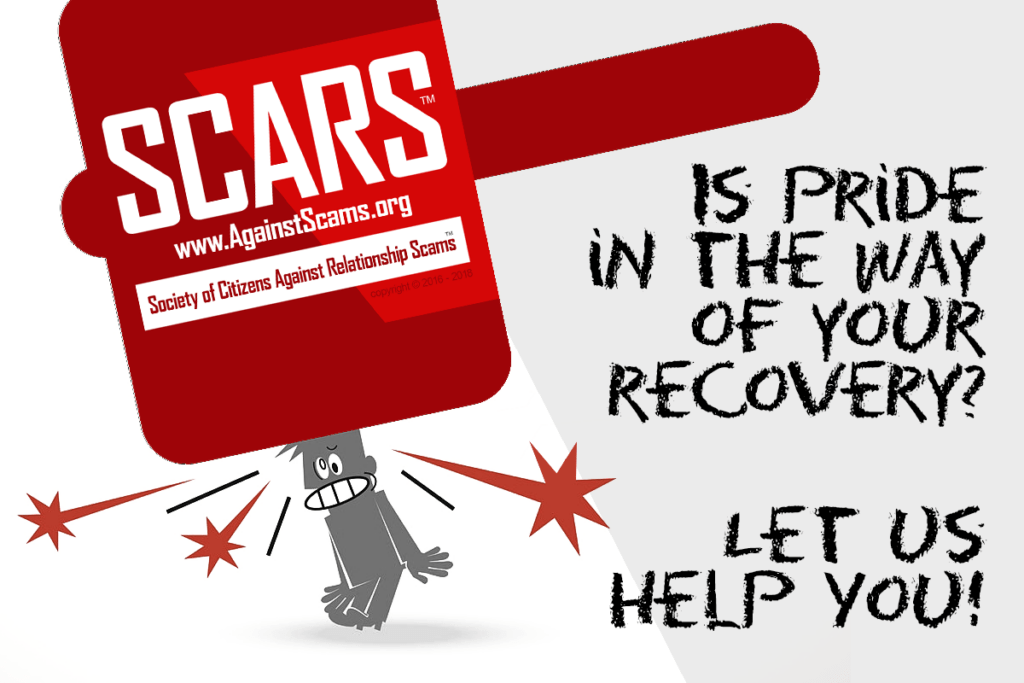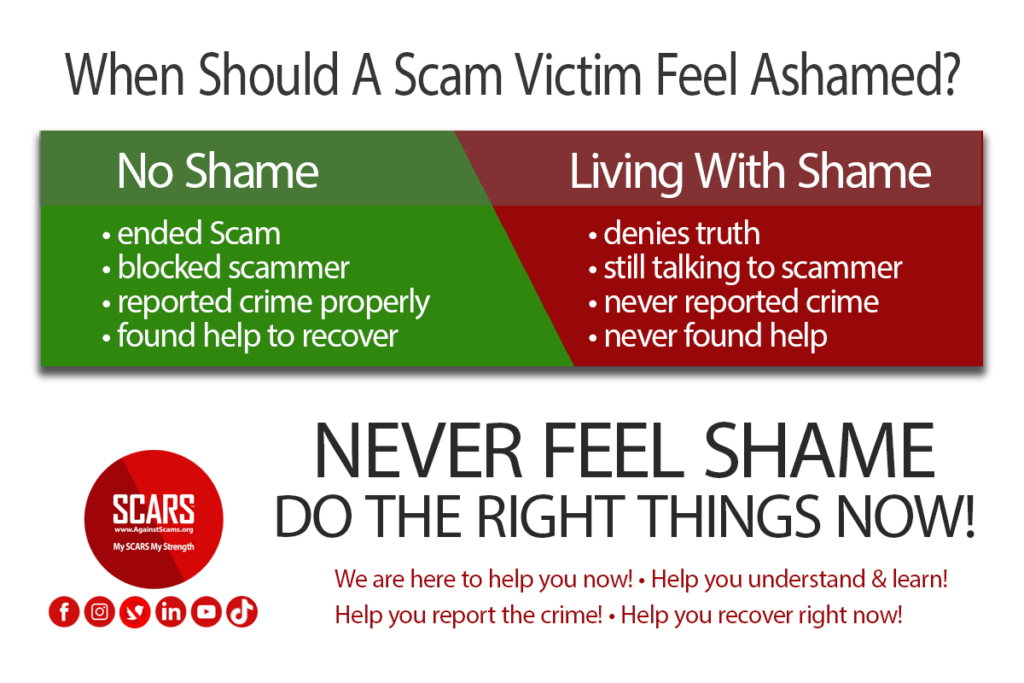Pride – A Dual-Edged Sword For Scam Victims
Pride And Shame Can Be Considered Two Sides Of The Same Coin For Scam Victims
Primary Category: Scam Victim Recovery Psychology
Authors:
• Vianey Gonzalez B.Sc(Psych) – Licensed Psychologist Specialty in Crime Victim Trauma Therapy, Neuropsychologist, Certified Deception Professional, Psychology Advisory Panel & Director of the Society of Citizens Against Relationship Scams Inc.
• Tim McGuinness, Ph.D. – Anthropologist, Scientist, Director of the Society of Citizens Against Relationship Scams Inc.
About This Article
Pride and shame often function as two sides of the same coin for scam victims, creating complex emotional barriers to recovery. Pride, whether authentic or hubristic, can become a lingering obstacle when victims struggle to reconcile their pre-scam self-image with the aftermath of being deceived. This internal conflict often leads to shame, as victims blame themselves for perceived gullibility or inadequacy.
Shame, in turn, can erode self-esteem and hinder progress by fostering avoidance, denial, and self-doubt. Recognizing this interplay is essential for healing. By reframing the scam as a learning experience, practicing self-compassion, and seeking supportive connections, victims can transform these emotions into catalysts for growth. Recovery requires letting go of maladaptive pride, addressing shame constructively, and building resilience through adaptive pride and small, meaningful achievements.

Pride And Shame Can Be Considered Two Sides Of The Same Coin For Scam Victims
Individuals who had great pride in their achievements, success, stability, and even wealth before a scam may experience significant shame and self-doubt when they are no longer able to maintain the same levels after being scammed.
Scam victims’ pride in themselves can quickly turn into shame, but that pride does not simply go away, it can linger and become a barrier to effective recovery – becoming a form of denial.
This can be a complex and challenging experience, but there are ways to cope with these emotions and move forward.
What is Pride – Psychologically Speaking
The standard definition of pride is:
Psychologically, pride is a complex emotion that encompasses a sense of self-worth, satisfaction, and accomplishment derived from one’s achievements, qualities, or actions. It involves a positive evaluation of oneself based on internal standards or external accomplishments.
At its core, pride can be categorized into two main forms:
Authentic Pride: This type of pride is associated with a genuine sense of accomplishment and self-worth. It arises from internal achievements, personal growth, or living up to one’s values and standards. Authentic pride is linked to healthy self-esteem and a positive self-image. Also, see the Striatum.
Hubristic Pride: Contrary to authentic pride, hubristic pride is characterized by arrogance, superiority, and an inflated sense of self-importance. It often involves seeking validation and superiority over others, leading to narcissistic or egotistical behaviors. This form of pride is associated with negative outcomes and interpersonal difficulties.
Most people have a mix of the two, and this can create significant challenges for scam victims trying to recover.
Psychologically, pride serves various functions:
Motivation: It can motivate individuals to strive for success, as the feeling of pride reinforces positive behaviors and accomplishments.
Self-Worth: Pride contributes to a sense of self-worth and identity, bolstering confidence and resilience in the face of challenges.
Social Interaction: It plays a role in social hierarchies, influencing how individuals present themselves and seek validation or respect from others.
While pride can be a positive and motivating emotion, excessive pride or the wrong kind of pride (hubristic) may lead to negative consequences, including arrogance, intolerance, and strained relationships. It can also lead to denial and many forms, such as the inability to accept the present situation and adapt to it as necessary to overcome the issues of being a crime victim.
Balancing pride with humility and recognizing the achievements without diminishing others’ worth is crucial for psychological well-being and healthy social interactions.
Pride and Shame
Pride and shame are two complex and interrelated emotions that often operate in a reciprocal manner – two sides of the same coin. While they may seem diametrically opposed, they are both rooted in an individual’s perception of their own worth and their place in the world.
Pride is a positive emotion that stems from feelings of accomplishment, competence, and self-worth. It is often associated with positive outcomes such as increased motivation, self-esteem, and resilience. When individuals experience pride, they feel a sense of satisfaction and fulfillment in their achievements, skills, or qualities.
Shame, on the other hand, is a negative emotion that arises from feelings of inadequacy, humiliation, or a sense of having fallen short of expectations (our own or those of others.) It is often associated with negative consequences such as decreased self-esteem, anxiety, and social withdrawal. When individuals experience shame, they feel a sense of worthlessness, embarrassment, or regret for their perceived failings or shortcomings. Being the victim of a crime can amplify shame even more if the victim cannot adapt to their present circumstances and accept uncertainty.
The relationship between pride and shame is complex and can manifest in various ways:
Pride can protect against shame: Pride can serve as a defense mechanism against feelings of shame and vulnerability. By maintaining a high sense of self-worth and avoiding situations that could trigger feelings of inadequacy, individuals can shield themselves from the discomfort of shame.
Pride can lead to shame: Excessive pride or an inflated sense of self-importance can lead to shame when individuals face setbacks, make mistakes, or fail to meet their own unrealistic expectations as occurs during the aftermath of scams. The fall from grace can be particularly painful for those who have built their identity on a foundation of pride.
Shame can motivate change: Sometimes shame can serve as a catalyst for positive change. When individuals experience shame, they may be motivated to address their shortcomings, improve their behavior, or strive to meet higher standards. However, this is a difficult path and people often fail so relying on shame as a motivator is not a great idea!
Shame can hinder progress: Chronic or deep shame can become deeply ingrained in an individual’s self-perception, leading to a cycle of self-doubt and avoidance. This can hinder personal growth, prevent individuals from taking risks, and perpetuate a sense of inadequacy.
Navigating the complex interplay between pride and shame requires a delicate balance of self-acceptance and self-improvement. While pride can provide a sense of accomplishment and motivation, excessive pride can lead to arrogance and a denial of one’s flaws, situation, and thee real uncertainties that come after being victimized. Similarly, while shame can be a catalyst for change, chronic shame can become debilitating and hinder personal growth, and stall or destroy a victim’s path to recovery.
The key lies in cultivating a healthy sense of self-worth that is not solely dependent on external validation or achievements. By embracing humility, recognizing one’s imperfections, and practicing self-compassion, individuals can navigate the spectrum of pride and shame in a way that promotes personal growth and a fulfilling life. In other words, let pride go and focus on real accomplishments in whatever phase of life a person is in.
Adaptive & Maladaptive Pride
Pride functions differently in people who have been traumatized, such as scam victims.
Adaptive and maladaptive pride are two distinct forms of pride that can significantly impact individuals, particularly victims of scams and fraud. Understanding the nuances of these two forms of pride can help victims navigate the emotional turmoil and psychological challenges they may face in the aftermath of a scam.
Impact of Adaptive and Maladaptive Pride on Scam Victims
Victims of scams and fraud often experience a complex interplay of adaptive and maladaptive pride. While adaptive pride can provide resilience and motivation to rebuild their lives, maladaptive pride can hinder their recovery process and exacerbate feelings of shame and self-doubt.
Adaptive Pride
Adaptive pride is a healthy and constructive form of pride that arises from a sense of accomplishment, competence, and self-worth. It is characterized by a positive self-perception rooted in genuine achievements and a realistic assessment of one’s strengths and abilities. Adaptive pride motivates individuals to pursue their goals, overcome obstacles, and maintain a healthy sense of self-esteem.
Adaptive pride can help scam victims:
Rebuild self-esteem: Focusing on new goals and achievements can restore a sense of accomplishment and self-worth. In support groups having a focus on milestones and achievements helps with this.
Maintain resilience: The positive self-perception associated with adaptive pride can provide the strength to persevere through challenges.
Promote positive self-talk: A healthy sense of pride can counteract negative self-beliefs and foster a more optimistic outlook. Using affirmations to help keep resilience and goals in mind can help.
Maladaptive Pride
Maladaptive pride, on the other hand, is an unhealthy and destructive form of pride characterized by an inflated sense of self-importance, arrogance, and a need for external validation. It often stems from a deep-seated insecurity or fear of inadequacy, leading individuals to overcompensate by exaggerating their accomplishments or diminishing the achievements of others.
Maladaptive pride can hinder scam victims:
Impedes acceptance of responsibility: An inflated ego may prevent individuals from acknowledging their role in the scam, hindering learning and growth – this manifests as a form of denial.
Exacerbates feelings of shame: The fear of failure and public perception can intensify feelings of inadequacy and self-judgment.
Hinders seeking support: The need to maintain an image of infallibility may prevent individuals from seeking help, preventing the recovery process.
Pride in Individuals with Emotional Trauma
Emotional trauma can have a profound impact on an individual’s sense of pride, often leading to a decline in adaptive pride and an increase in maladaptive pride. This shift in pride can manifest in various ways:
Loss of Self-Esteem and Confidence: Trauma can shatter an individual’s sense of self-worth, leading to feelings of inadequacy and a loss of confidence in their abilities. This can make it difficult to experience adaptive pride, as individuals may not feel like they have achieved anything worthwhile.
Development of Defensiveness and Arrogance: As a coping mechanism, individuals may develop a defensive attitude, using maladaptive pride to protect their fragile self-esteem. They may become overly sensitive to criticism, lash out at others, or exaggerate their accomplishments to maintain a sense of superiority.
Difficulty in Accepting Help and Support: Maladaptive pride can also make it difficult for individuals to seek help or support, as they may view it as a sign of weakness or failure. This can hinder their recovery from trauma and prevent them from building healthy relationships.
Understanding the Shame Response
Shame is a powerful emotion that arises from a perceived discrepancy between one’s actual self and one’s ideal self – in other words our pride and who we actually are or perceive we are. In the context of a scam, individuals may feel ashamed of their perceived gullibility, lack of judgment, or inability to protect themselves. This shame can be further amplified by feelings of disappointment, regret, and fear of failure.
Impacts of Shame on Achievement and Self-Esteem
Shame can have a profound impact on an individual’s motivation and ability to achieve their goals. The fear of making mistakes or failing again can lead to avoidance behaviors, procrastination, and a reluctance to take risks. Additionally, shame can erode self-esteem, making it difficult to believe in one’s abilities or pursue new opportunities.
Coping Strategies for Shame and Self-Doubt:
Acknowledge and Accept Emotions: Allow yourself to feel and experience the emotions of shame and self-doubt without judgment. Trying to suppress or ignore these emotions will only make them stronger.
Reframe the Experience: Instead of viewing the scam as a personal failure, try to reframe it as a learning experience. Identify what you can do differently in the future to protect yourself from scams.
Practice Self-Compassion: Be kind and understanding towards yourself. Recognize that everyone makes mistakes, and that being scammed does not make you a bad or unworthy person.
Focus on Progress, Not Perfection: Set realistic goals and celebrate your progress along the way. Don’t get discouraged by setbacks; focus on continuous improvement rather than achieving perfection.
Seek Support from Others: Talk to trusted friends, family members, or a therapist about your experiences. Sharing your feelings and seeking support can provide a sense of relief and validation.
Maintain Perspective: Remember that a scam does not define your entire life or worth. Focus on your strengths, accomplishments, and the positive aspects of your life.
Overcoming Pride Issues in Trauma Recovery
Addressing pride issues in trauma recovery is crucial for fostering self-acceptance, promoting healthy relationships, and facilitating personal growth. Here are some strategies that can aid in this process:
Psychotherapy: Engaging in psychotherapy can help individuals identify their pride-related challenges, understand the underlying causes, and develop healthier coping mechanisms.
Challenging Negative Self-Talk: Recognizing and challenging negative self-beliefs can help individuals replace maladaptive pride with a more realistic and positive self-image.
Practicing Self-Compassion: Cultivating self-compassion can help individuals forgive themselves for past mistakes, accept their imperfections, and embrace their vulnerabilities.
Celebrating Small Victories: Focusing on and celebrating small achievements can gradually rebuild self-esteem and promote adaptive pride.
Seeking Help from Support Systems: Seeking help from supportive friends, family members, or support groups can provide a safe space to process emotions, receive encouragement, and learn from others’ experiences. See support.AgainstScams.org for support group options.
Remembering that recovery from trauma is a journey, not a destination, individuals can gradually work through pride-related issues, build adaptive pride, and build a healthier and more fulfilling life.
Moving Forward with Renewed Confidence
Overcoming shame and self-doubt after a scam takes time and effort!
By acknowledging and accepting your emotions, reframing the experience, practicing self-compassion, and seeking support, you can gradually regain your confidence and move forward with renewed determination. Remember, you are not alone in this experience, and resources are available to help you recover and rebuild your self-esteem – see below for SCARS Resources.
More:
- Shame – Secrets & Lies (romancescamsnow.com)
- Toxic Self-Narratives That Feeds Depression in Scam Victims 2023 (scamsnow.com)
- Striatum – Psychology of Scams 2023 (scamsnow.com)
- Psychological Triggers/Emotional Triggers – What They Are And How They Work – 2023/2024 (scamsnow.com)
- Motivational Denial (scamsnow.com)
- The Self-Pity Trap & How To Overcome It (scamsnow.com)
- Hope & The “Pig Pen” Syndrome (scamsnow.com)
- Magical Thinking – How Biased & Delusional Thinking Enslaves Scam Victims (scamsnow.com)
- Scam Victims’ Recovery – Acknowledging The Harm Done (romancescamsnow.com)
- The Unique Shame Of Being Scammed Again (romancescamsnow.com)
- Guilt vs. Shame – Understanding [INFOGRAPHIC] 2021 (romancescamsnow.com)
- When Should A Scam Victim Feel Shame? (romancescamsnow.com)
- Understanding the Victim Complex/Victim Mentality In Relationship Scam Victims – Psychology Of Scams (romancescamsnow.com)
- Differences Between Men & Women Scam Victims (romancescamsnow.com)
Please Rate This Article
Please Leave Us Your Comment
Also, tell us of any topics we might have missed.
Leave a Reply
Thank you for your comment. You may receive an email to follow up. We never share your data with marketers.
SCARS Resources:
- For New Victims of Relationship Scams newvictim.AgainstScams.org
- Subscribe to SCARS Newsletter newsletter.againstscams.org
- Sign up for SCARS professional support & recovery groups, visit support.AgainstScams.org
- Find competent trauma counselors or therapists, visit counseling.AgainstScams.org
- Become a SCARS Member and get free counseling benefits, visit membership.AgainstScams.org
- Report each and every crime, learn how to at reporting.AgainstScams.org
- Learn more about Scams & Scammers at RomanceScamsNOW.com and ScamsNOW.com
- Global Cyber Alliance ACT Cybersecurity Tool Website: Actionable Cybersecurity Tools (ACT) (globalcyberalliance.org)
- Self-Help Books for Scam Victims are at shop.AgainstScams.org
- Donate to SCARS and help us help others at donate.AgainstScams.org
- Worldwide Crisis Hotlines: International Suicide Hotlines – OpenCounseling : OpenCounseling
- Campaign To End Scam Victim Blaming – 2024 (scamsnow.com)
-/ 30 /-
What do you think about this?
Please share your thoughts in a comment below!
More ScamsNOW.com Articles
-/ 30 /-
What do you think about this?
Please share your thoughts in a comment above!
SCARS LINKS: AgainstScams.org RomanceScamsNOW.com ContraEstafas.org ScammerPhotos.com Anyscam.com ScamsNOW.com
reporting.AgainstScams.org support.AgainstScams.org membership.AgainstScams.org donate.AgainstScams.org shop.AgainstScams.org
youtube.AgainstScams.org linkedin.AgainstScams.org facebook.AgainstScams.org
TABLE OF CONTENTS
- Pride And Shame Can Be Considered Two Sides Of The Same Coin For Scam Victims
- About This Article
- Pride And Shame Can Be Considered Two Sides Of The Same Coin For Scam Victims
- What is Pride – Psychologically Speaking
- Pride and Shame
- Adaptive & Maladaptive Pride
- Pride in Individuals with Emotional Trauma
- Understanding the Shame Response
- Overcoming Pride Issues in Trauma Recovery
- Moving Forward with Renewed Confidence
- More:
- SCARS Resources:
- Important Information for New Scam Victims
- Statement About Victim Blaming
- SCARS INSTITUTE RESOURCES:
- Psychology Disclaimer:
- More ScamsNOW.com Articles
- A Question of Trust
- SCARS Institute™ ScamsNOW Magazine
Society of Citizens Against Relationship Scams Inc. [SCARS]
META
MOST POPULAR COMMENTED ARTICLES
POPULAR ARTICLES
WHAT PEOPLE ARE TALKING ABOUT
LATEST SITE COMMENTS
See Comments for this Article at the Bottom of the Page
on Romance Scam/Fraud Can Be Local Not Just Online: “A stenographer who took down a lot of powerful people. Fascinating article.” Apr 25, 22:06
on Romance Scammers’ Favorite Lies Exposed: ““I have saved a lot of money, but my account is frozen. I need help making these transactions to my…” Apr 25, 21:53
on The Importance of Goal Setting for Scam Victims in Recovery – 2024: “The recovery journey seems daunting when you just think in all of the things you lost, the things you could…” Apr 25, 20:43
on Compassionate Reframing – a Very Important Recovery Tool for Scam Victims – 2025: “This article is very useful. Personally most of my thoughts were negative after the scam. SCARS lessons from the survivor’s…” Apr 25, 20:16
on Cruel Or Indifferent To Suffering – What Scammers Do And Why It Is So Important For Scam Victims To Understand – 2024: “We are truly sorry that you encounters hateful people, but WE are very proud to know you!” Apr 24, 21:07
on Helping Scam Victims To See Through Authority Bias To Expose The Scammers And Fraudsters For What They Are – 2024: “I love this in-the-moment thinking. The above questions could help in so many situations, bank-related and not. The pause needed…” Apr 24, 18:40
on Scam Victims Compliance With Scammer Authority Figures – 2024: “Understanding the various biases targeted by anyone portraying a police officer, government official or really any authority figure is helpful.…” Apr 24, 18:26
on Sleep Deprivation As A Scammer’s Control Technique And Its Effect On Scam Victims – 2024: “This time, one year ago, I was being kept awake about 20 hours a day. Being woken up at all…” Apr 24, 18:09
on Indoctrination Of Scam Victims By Their Scammers? Yes! – 2024: “Many of these examples were used on me and they certainly kept me coming back to them. As I read…” Apr 24, 16:35
on Glimmers of Light – the Positive Side of Experience for Scam Victims – 2025: “Glimmers – each of us can and should find such things in our lives that give us some joy, help…” Apr 24, 14:29
on Cruel Or Indifferent To Suffering – What Scammers Do And Why It Is So Important For Scam Victims To Understand – 2024: “I am Asian American. I suffered discrimination since emigrated to the USA in the late ‘70s. I’ve had human fecal…” Apr 24, 12:38
on The Scout Mindset And Scam Victims: “Very informative article that helps me to see how my thinking is a bit more Scout versus Soldier. But there…” Apr 24, 10:12
on Contractualism and Supporting the Victims of Online Crime: “So often in our lives we do not apply the concept of contractualism. We do not specifically “see” that each…” Apr 23, 14:46
on Scam Victims: Applying Boundaries When Compassion Is Required Instead – 2023: “If there is one thing my crime has taught me is that I had a very limited toolbox for dealing…” Apr 23, 13:34
on Understanding the Right Priorities – Another View of New Scam Victims’ Challenges – 2024: “In my case, not knowing about scams, the kind of people and manipulation that I dealed with, not knowing how…” Apr 22, 20:43
on The Courage it Takes to Recover from a Scam – For Scam Victims in Recovery – 2025: “After the scam I thought that almost everything was about what I lost and just a bit about what took…” Apr 22, 20:24
on Thoughts About Boundaries: “I have had trouble with setting boundaries in my life because it got mixed with the message about being selfish.…” Apr 22, 14:41
on The Science Of Victimology – What Is It? – 2023: “Thank you for this definition and for explaining what to look for to segregate experienced, real victimologists from amateurs. I…” Apr 22, 14:00
on Love Bombing & Amygdala Hijacked Scam Victims – Love Is Chemical After All – 2024: “Better understanding how emotions are coerced and forced instead being real helps to accept that this all truly was not…” Apr 22, 13:42
on A Reflection on Christ’s Suffering and Radical Acceptance of the Worst Possible Outcome – 2025: “A strong message, especially at this time of Easter!” Apr 19, 23:16
Important Information for New Scam Victims
Please visit www.ScamVictimsSupport.org – a SCARS Website for New Scam Victims & Sextortion Victims
SCARS Institute now offers a free recovery program at www.SCARSeducation.org
Please visit www.ScamPsychology.org – to more fully understand the psychological concepts involved in scams and scam victim recovery
If you are looking for local trauma counselors, please visit counseling.AgainstScams.org
If you need to speak with someone now, you can dial 988 or find phone numbers for crisis hotlines all around the world here: www.opencounseling.com/suicide-hotlines
Statement About Victim Blaming
Some of our articles discuss various aspects of victims. This is both about better understanding victims (the science of victimology) and their behaviors and psychology. This helps us to educate victims/survivors about why these crimes happened and not to blame themselves, better develop recovery programs, and help victims avoid scams in the future. At times, this may sound like blaming the victim, but it does not blame scam victims; we are simply explaining the hows and whys of the experience victims have.
These articles, about the Psychology of Scams or Victim Psychology – meaning that all humans have psychological or cognitive characteristics in common that can either be exploited or work against us – help us all to understand the unique challenges victims face before, during, and after scams, fraud, or cybercrimes. These sometimes talk about some of the vulnerabilities the scammers exploit. Victims rarely have control of them or are even aware of them, until something like a scam happens, and then they can learn how their mind works and how to overcome these mechanisms.
Articles like these help victims and others understand these processes and how to help prevent them from being exploited again or to help them recover more easily by understanding their post-scam behaviors. Learn more about the Psychology of Scams at www.ScamPsychology.org
SCARS INSTITUTE RESOURCES:
IF YOU HAVE BEEN VICTIMIZED BY A SCAM OR CYBERCRIME
♦ If you are a victim of scams, go to www.ScamVictimsSupport.org for real knowledge and help
♦ Enroll in SCARS Scam Survivor’s School now at www.SCARSeducation.org
♦ To report criminals, visit https://reporting.AgainstScams.org – we will NEVER give your data to money recovery companies like some do!
♦ Sign up for our free support & recovery help by https://support.AgainstScams.org
♦ Join our WhatsApp Chat Group at: https://chat.whatsapp.com/BPDSYlkdHBbDBg8gfTGb02
♦ Follow us on X: https://x.com/RomanceScamsNow
♦ Follow us and find our podcasts, webinars, and helpful videos on YouTube: https://www.youtube.com/@RomancescamsNowcom
♦ SCARS Institute Songs for Victim-Survivors: https://www.youtube.com/playlist…
♦ See SCARS Institute Scam Victim Self-Help Books at https://shop.AgainstScams.org
♦ Learn about the Psychology of Scams at www.ScamPsychology.org
♦ Dig deeper into the reality of scams, fraud, and cybercrime at www.ScamsNOW.com and www.RomanceScamsNOW.com
♦ Scam Survivor’s Stories: www.ScamSurvivorStories.org
♦ For Scam Victim Advocates visit www.ScamVictimsAdvocates.org
♦ See more scammer photos on www.ScammerPhotos.com
You can also find the SCARS Institute on Facebook, Instagram, X, LinkedIn, and TruthSocial
Psychology Disclaimer:
All articles about psychology and the human brain on this website are for information & education only
The information provided in this and other SCARS articles are intended for educational and self-help purposes only and should not be construed as a substitute for professional therapy or counseling.
Note about Mindfulness: Mindfulness practices have the potential to create psychological distress for some individuals. Please consult a mental health professional or experienced meditation instructor for guidance should you encounter difficulties.
While any self-help techniques outlined herein may be beneficial for scam victims seeking to recover from their experience and move towards recovery, it is important to consult with a qualified mental health professional before initiating any course of action. Each individual’s experience and needs are unique, and what works for one person may not be suitable for another.
Additionally, any approach may not be appropriate for individuals with certain pre-existing mental health conditions or trauma histories. It is advisable to seek guidance from a licensed therapist or counselor who can provide personalized support, guidance, and treatment tailored to your specific needs.
If you are experiencing significant distress or emotional difficulties related to a scam or other traumatic event, please consult your doctor or mental health provider for appropriate care and support.
Also read our SCARS Institute Statement about Professional Care for Scam Victims – click here
If you are in crisis, feeling desperate, or in despair, please call 988 or your local crisis hotline.
More ScamsNOW.com Articles
A Question of Trust
At the SCARS Institute, we invite you to do your own research on the topics we speak about and publish. Our team investigates the subject being discussed, especially when it comes to understanding the scam victims-survivors’ experience. You can do Google searches, but in many cases, you will have to wade through scientific papers and studies. However, remember that biases and perspectives matter and influence the outcome. Regardless, we encourage you to explore these topics as thoroughly as you can for your own awareness.
















![scars-institute[1]](https://scamsnow.com/wp-content/uploads/2025/04/scars-institute1.png)
![niprc1.png1_-150×1501-1[1]](https://scamsnow.com/wp-content/uploads/2025/04/niprc1.png1_-150x1501-11.webp)

Being mindful of my feelings and emotions after the scam and learning to let go of those that did not help me to recover was very liberating. I am grateful for how far I’ve progressed in SCARS Survivor school. It is worth its weigh in gold!